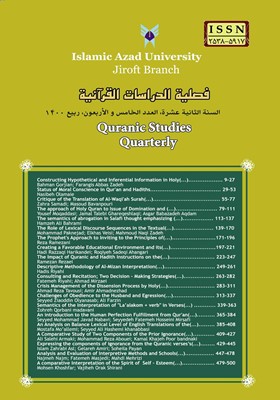-
-
List of Articles
-
Open Access Article
1 - Constructing Hypothetical and Inferential Information in Holy Quran from Approach of a Systematic Linguistics’ Viewpoint
Bahman Gorjian Farangis Abbas Zadeh -
Open Access Article
2 - Status of Moral Conscience in Qur'an and Hadiths
Nasibeh Olamaie -
Open Access Article
3 - Critique of the Translation of Al-Waqi'ah Surah (Case study: translation of Abolfazl Bahrampour)
Zahra Samadi Masoud Bavanpouri -
Open Access Article
4 - The approach of Holy Quran to Issue of Domination and Submission
Yousef Moqaddasi Jamal Talebi Ghareqeshlaqi Asgar Babazadeh Aqdam -
Open Access Article
5 - The semantics of abrogation in Salafi thought emphasizing on the views of Ibn Taymiyyah
Hamzeh Ali Bahrami -
Open Access Article
6 - The Role of Lexical Discourse Sequences in the Textual Coherence of Persian and English Interpretive Translations (Al-Baqarah Surah)
Mohammad Paknejad Elkhas Veisi Mahmoud Naqi Zadeh -
Open Access Article
7 - The Prophet's Approach to Inviting to the Principles of Islam based on Qur'anic Instructions
Reza Ramezani -
Open Access Article
8 - Creating a Favorable Educational Environment and its Impact on education Improvement emphasizing A'raf Surah
Hadi Razzaqi Harikandei Roqiyeh Sadeqi Ahangari -
Open Access Article
9 - A Comparative Study of Two Components of the Prior Ignorance, Awakening and Violence Against Women, with Modern Ignorance from Qur'an’s Viewpoint
Ali Salehi Armaki Mohammad Reza Abouei Kamal Khajeh Poor bandnaki -
Open Access Article
10 - The Impact of Quranic and Hadith Instructions on the Civilization of Buyid Dynasty and its Influence on Aḍud al-Dawla’s Practical Measures
Ramezan Rezaei -
Open Access Article
11 - Descriptive Methodology of Al-Mizan Interpretation based on Content Analysis of Qaaf Surah
Hadis Riyahi -
Open Access Article
12 - Consulting and Recitation; Two Decision – Making Strategies in Islamic and Quranic Culture
Fatemeh Riyahi Ahmad Mirzaei -
Open Access Article
13 - Crisis Management of the Dissension Process by Holy Prophet from Holy Quran’s Viewpoint
Ahmad Reza Tavousi Amir Ahmadnezhad -
Open Access Article
14 - Challenges of Obedience to the Husband and Egression Strategies in Verses and Hadiths
Seyyed Ziaoddin Olyanasab Ali Farzin -
Open Access Article
15 - Semantics of the Interpretation of "La’alakom + verb" in Verses of Holy Quran based on Langacker's Theory
Zohreh Qorbani madavani -
Open Access Article
16 - An introduction to the Human Perfection Fulfillment from Qur'an and Hadiths’ Viewpoint
Seyyed Mohammad Javad Nabavi Seyyedeh Fatemeh Hosseini Mirsafi -
Open Access Article
17 - An Analysis on Balance Lexical Level of English Translations of the Holy Quran based on Baker's Theory (Case study)
Mostafa Mo’allemi Seyyed Ali Hashemi khanabbasi -
Open Access Article
18 - Expressing the components of ignorance from the Quranic verses’s Viewpoint
Islam Zahrabi Asl Gelareh Amiri Soheila Payan -
Open Access Article
19 - Analysis and Evaluation of Interpretive Methods and Schools: Qadr and Kowsar Surahs case study
Najmeh Najm Fatemeh Masjedi Mahdi Mehrizi -
Open Access Article
20 - A comparative Interpretation of the Spirit of Self – Esteem from Parties’ Viewpoint
Mohsen Khoshfar Vajiheh Orak Shirani
-
The rights to this website are owned by the Raimag Press Management System.
Copyright © 2021-2025







